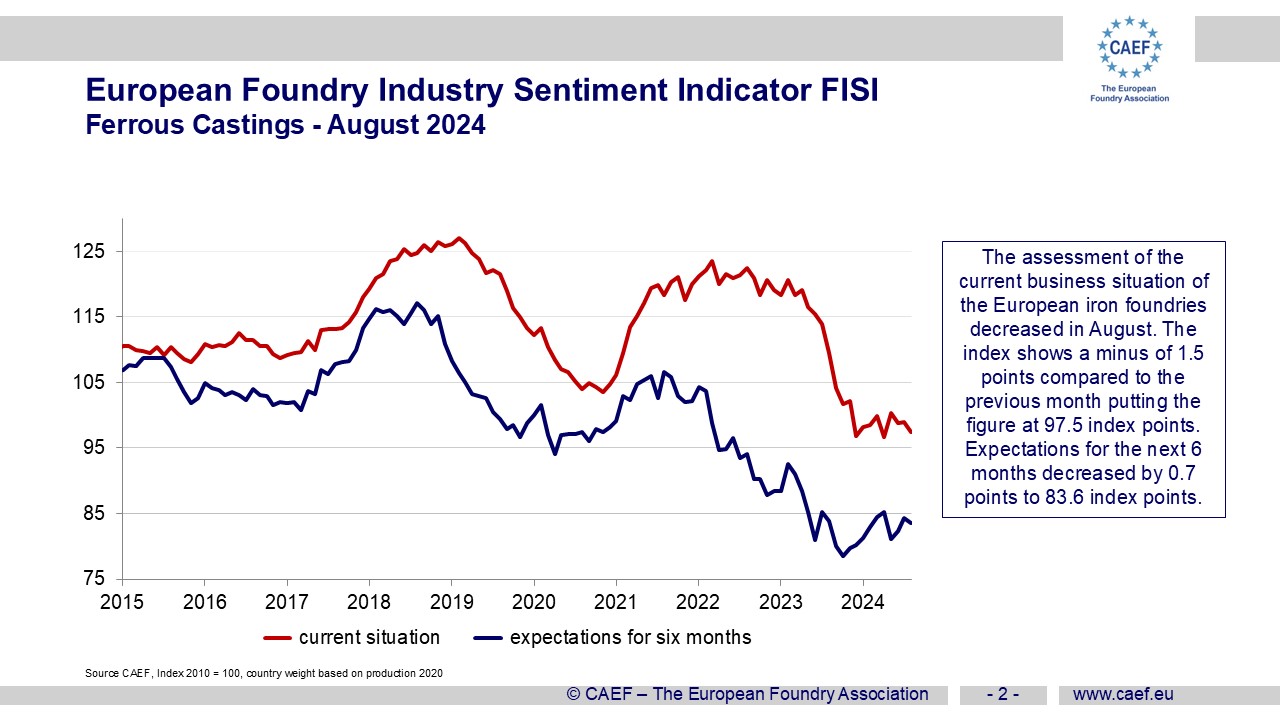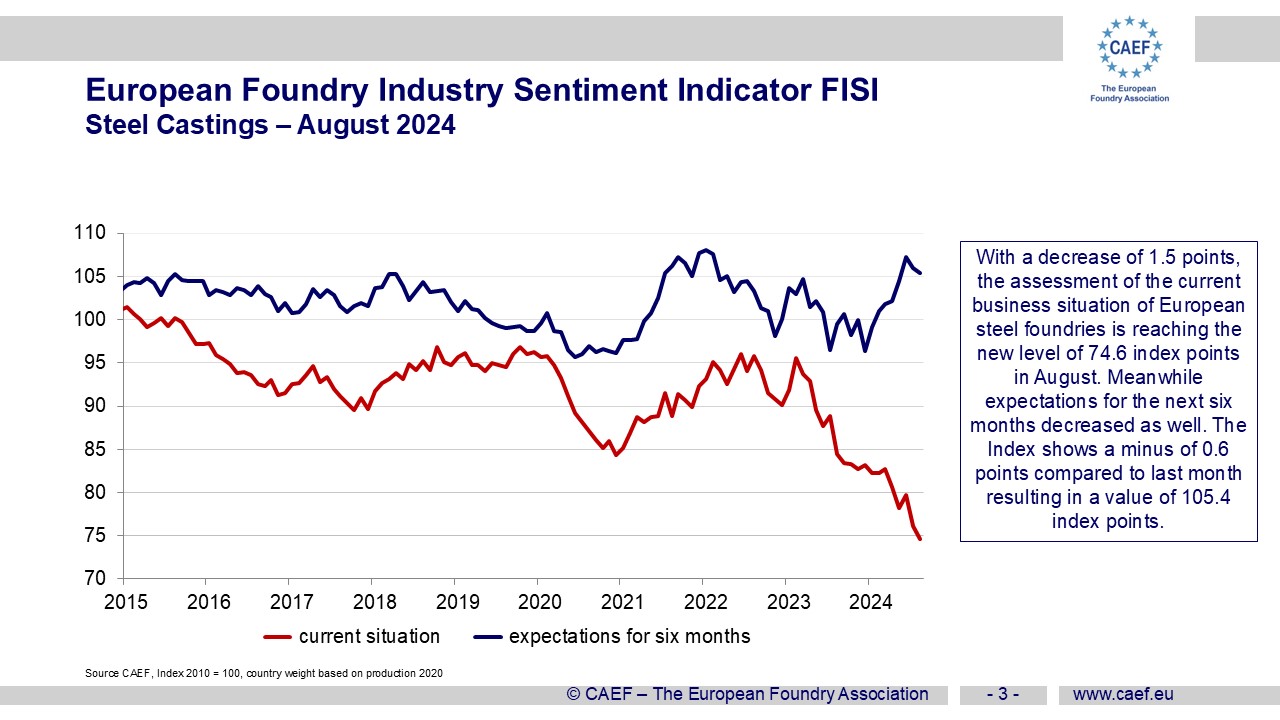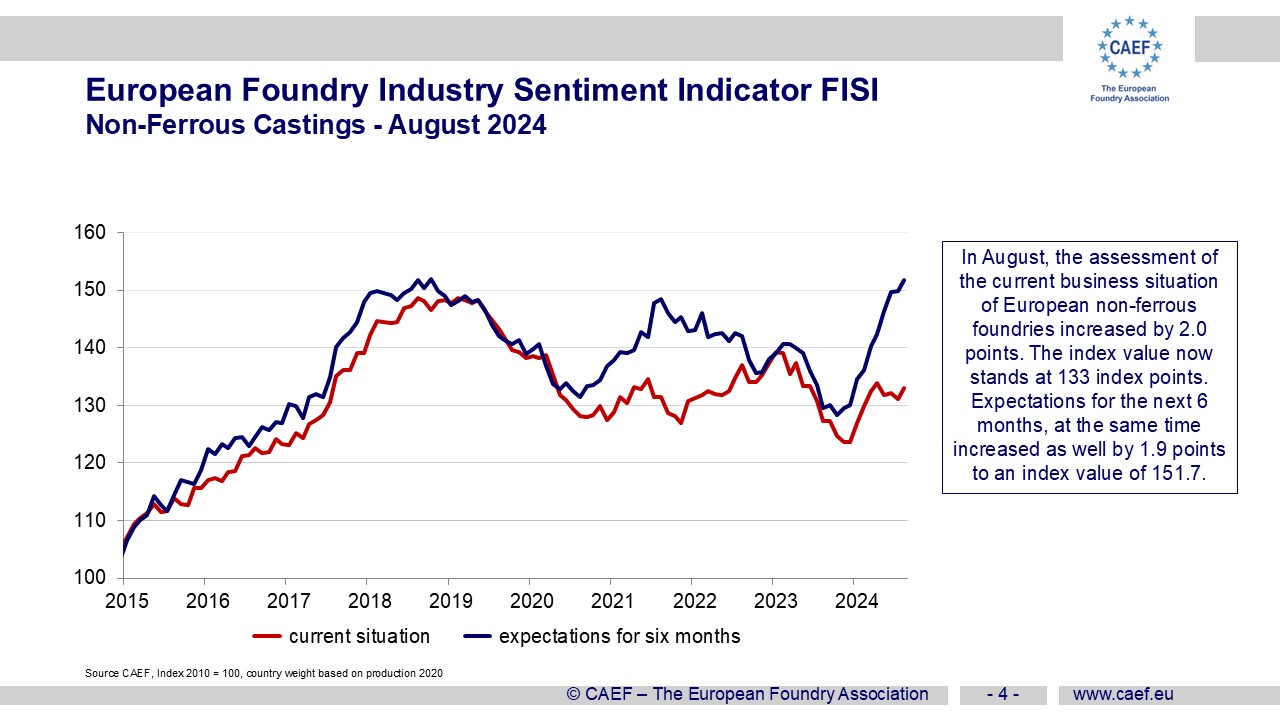
L’indice FISI (Foundry Industry Sentiment Indicator) est publié chaque mois par l’association européenne de fonderie EFF (ex-CAEF) à partir des réponses des organisations membres, dont la Fédération Forge Fonderie, sur le climat des affaires dans le secteur de la fonderie (fonte, acier et non-ferreux) à date et leurs attentes pour les six prochains mois.



Télécharger les résultats de l’indice FISI d’août 2024
Comme nous l’avions anticipé, la légère hausse de l’indice FISI en juillet à 95,5 points d’indice était provisoire et l’indice baisse en août de 0,7 point pour s’établir à 94,8 points d’indice.
Cette baisse peut être en partie attribuée à la situation macroéconomique complexe qui perdure en Europe. Malgré une certaine amélioration des prix de l'énergie et des coûts des matières premières, qui n'ont plus atteint leurs sommets, les perspectives économiques globales restent quelque peu stagnantes. De nombreuses économies européennes continuent d'évoluer en dents de scie plutôt que de faire preuve d'un élan significatif, ce qui se traduit par un manque notable de nouvelles commandes. L'incertitude est renforcée par l'élection présidentielle américaine de 2024, qui incite de nombreux clients à retarder leurs décisions jusqu'à ce que le résultat soit clair. Ceci est particulièrement important pour les industries dont les chaînes d'approvisionnement sont mondiales, car les changements politiques potentiels pourraient avoir des implications considérables. De même, la formation de la nouvelle Commission européenne suscite un certain attentisme chez les clients, car les entreprises restent prudentes quant aux changements réglementaires à venir sur le marché européen. Malgré ce ralentissement, les perspectives sont légèrement optimistes. Les conditions actuelles du marché mettent toutefois en évidence les défis permanents auxquels l'industrie de la fonderie en Europe doit faire face.
Parallèlement, l'indice BCI a poursuivi sa tendance à la baisse en août, passant de -0,61 à -0,62 points d'indice. Cette légère baisse souligne les difficultés persistantes de l'environnement des affaires, l’indice BCI restant nettement inférieur au seuil de neutralité de 0 point d'indice. La baisse de l'indice de confiance pour le mois d'août peut être liée à différents facteurs. Tout d'abord, les entreprises expriment des perspectives plus modérées en ce qui concerne le niveau des carnets de commandes, ce qui indique un affaiblissement des perspectives de la demande dans l'industrie. Cette baisse des commandes suscite des inquiétudes quant à la capacité de production dans les mois à venir. En outre, l'accalmie estivale typique de l'activité économique a encore accentué le ralentissement. Enfin, l'incertitude persistante quant à la composition et aux politiques de la prochaine Commission européenne a incité les entreprises à la prudence, contribuant ainsi à la morosité générale. L'ensemble de ces éléments donne une image plus prudente du climat des affaires, les entreprises restant hésitantes quant aux perspectives économiques à court et à long terme.
Source : Traduction du communiqué CAEF ( https://www.caef.eu/european-foundry-industry-sentiment-58/)
| News |
 |
|
March 26 2025
European Foundry Industry Sentiment Indicator (FISI) marks an increase in February 2025
February 2025 was the second month in a row, which displayed delicate signs that the situation of the European foundry industry is beginning to improve. The European Foundry Industry Sentiment Indicator (FISI), conducted monthly by the European Foundry Federation, shows signs of a slight economic recovery. Compared to the data from January 2025, the FISI increased from 91.3 to 93.4. This does not mean an automatic, sudden, certain and dynamic economic growth in the upcoming months, yet these are the first signs that the European foundry industry is slowly recovering after an exceptionally difficult year 2024, when the FISI index value fell every month – from 96.2 in January to 89.0 in December 2024. This rise suggests a slight improvement in the industry’s outlook, moving closer to the neutral 100-point mark. This development is partly due to positive expectations for the second half of 2025, as businesses anticipate potential growth and stabilization in demand. At the same time, in February 2025, the Business Climate Indicator (BCI), an index published by European Commission increased from ‑0.94 in January to ‑0.74 and according to the latest news, the euro zone’s GDP growth is expected to increase by +1.4% in 2025, up slightly from +0.7% in 2024.
The latest data shows a normalization of the situation in the eurozone’s manufacturing sector. The eurozone manufacturing Purchasing Managers’ Index (PMI) rose to 47.6 in February 2025, from 46.6 in January and from 45.1 in December, almost approaching the 50-point threshold that separates growth from contraction. Purchasing Managers’ Index (PMI) in the Euro area is an indicator of the economic health of the manufacturing sector. It is based on such indicators as: new orders, inventory levels, production, supplier deliveries and the employment environment. Geopolitical events, those of recent weeks, months and years, have caused revolutions in most industries in Europe. In the foundry industry, it began with a drastic increase in the prices of materials and energy, and declines in production in almost every EU country. Now, the diversification of foundry production is increasingly noticeable. Due to the geopolitical situation, the arms industry and energy industry — which have always been significant recipients of castings — are gaining importance.
The FISI – European Foundry Industry Sentiment Indicator – is the earliest available composite indicator providing information on the European foundry industry performance. It is published by CAEF the European Foundry Association every month and is based on survey responses of the European foundry industry. The CAEF members are asked to give their assessment of the current business situation in the foundry sector and their expectations for the next six months. The BCI – Business Climate Indicator – is an indicator published by the European Commission. The BCI evaluates development conditions of the manufacturing sector in the euro area every month and uses five balances of opinion from industry survey: production trends, order books, export order books, stocks and production expectations. |
| Read more |
| Directory |  |
| Forge Fonderie Magazine |
 |
| Indicators |  |
| Press Room |  |
| Join us |  |
© 2016 Fédération Forge Fonderie - Credits & legal notice